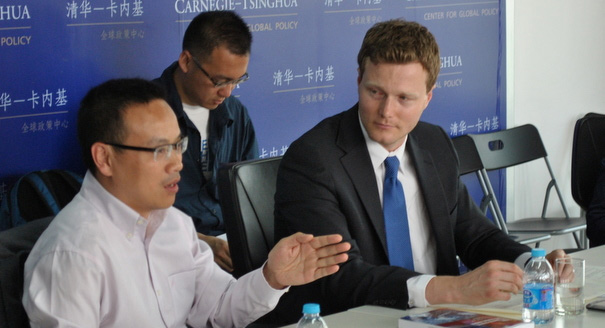Registration
You will receive an email confirming your registration.
IMGXYZ4136IMGZYXThe West is becoming increasingly frustrated with Iran’s plans to develop nuclear technology. The ongoing negotiations in Baghdad are the latest diplomatic attempt to prevent Iran from developing advanced nuclear technologies and some on the international community believe that few alternatives remain for a diplomatic resolution regarding Iran’s nuclear situation.
Carnegie-Tsinghua’s Chen Qi hosted a roundtable discussion with Matthew Kroenig, assistant professor at Georgetown University, Hua Liming, former Chinese ambassador to Iran, Carnegie senior associate Li Bin, and other Chinese and international experts. They discussed the various options faced by the international community in addressing the Iranian nuclear crisis.
Three Paths to Resolution
- Diplomacy: Kroenig stated that the most optimal solution to the current Iranian nuclear crisis would be through a diplomatic negotiation. He explained that reaching a settlement would best ensure no further development of nuclear weapons and, most importantly, would help to avoid war. The negotiations are set for May 23, 2012, but Kroenig remained skeptical about whether a deal could be struck. Hua stated it would be impossible to convince Iran to halt its nuclear weapon development because the nuclear program is an issue of “national dignity” for Iranians.
- Acquiescence: Kroenig explained that there would be grave consequences for global peace and security if Iran were allowed to develop nuclear weapons. Diplomats in attendance echoed this sentiment, arguing that international acquiescence is not an option. Kroenig explained that the main worry is that Iran’s possession of nuclear weapons would allow it to develop a more aggressive foreign policy, with far-reaching repercussions for stability in the Middle East and beyond.
- Military Action: Kroenig stated that the final and least desirable option for countering the Iranian nuclear threat would be military action by the international community. He explained that if the United States chose to strike, it could destroy all of Iran’s nuclear facilities and set back the program by three to ten years. This delay would open up space for further diplomacy, he added. Li added another potential benefit of a strike: once Iran accumulates enough Highly Enriched Uranium (HEU) it will be much easier for Iran to hide and protect it. Military action would prevent Iran from developing HEU before it was too late.
Costs and Consequences of Each Path
- Protracted Conflict: According to Kroenig, the costs of military action in Iran would not automatically result in war. Without a conventional military, Kroenig explained, Iran would encourage terrorism and launch isolated ballistic attacks. Given this, Li added that military action in Iran would likely be protracted.
- Economic Impacts: Kroenig warned that a military strike would lead to an Iranian retaliation, including the closure of the Strait of Hormuz and a spike in oil prices. He added that the United States could combat this by opening up strategic oil reserves while encouraging oil producing states, like Saudi Arabia, to produce more.
- International Diplomacy Moves Backward: Domestically, Kroenig explained that Iranian hardliners could be emboldened by a military strike. However, Kroenig added that although there may be short-term “rallying around the flag,” criticism of the government would soon follow. Since the United States would shoulder the majority of the burden for a military strike, Kroenig suggested that the United States may receive the same treatment as it did following the Iraq War. Given this, Carnegie-Tsinghua’s Zhang Chuangjie added that a U.S. strike on Iran could only reaffirm the international perception that the Obama administration is no different from George W. Bush’s administration.
China’s Position on the Crisis
- Overlapping Interests: Like the West, Hua asserted that China, too, does not want to see Iran acquire nuclear weapons. However, China wants to see this crisis resolved peacefully. Hua added that Beijing believes that Iran can have a peaceful nuclear program.
- Repercussions for China’s Energy Supply: Zha Daojiong, from Peking University noted there are three implications that the Iranian crisis could have on China’s energy demands. The first would be a reduction in oil imports. China imports a half million barrels of oil a day from Iran and this would need to be replaced. China is not convinced that other oil producing states could make up this difference, but would be open to sharing strategic reserves with the United States. The second would be a supply shock. If there were a protracted conflict there would be a surge in oil prices, a fact that China, and the world, would have to deal with. Finally, after the conflict, the world would have trouble stabilizing the oil supply market and Iranian society.
- Delayed Shift From the Pivot: According to Zhang, a U.S. attack on Iran could be perceived by some as a blessing for China and a change in the U.S. “Pivot to Asia” policy. China’s Ministry of Foreign Affairs, Zhang added, would likely be relieved if the United States were to strike Iran, since it could mean less of a U.S. focus on China and East Asia.
Discussants included: Zha Daojiong, Zhou Fangyin, Dana Benvenisti, Deji Okediji
